How to write your Agricultural Grant Funding Proposal
You can create your customized editable variation of this document using Proposal Kit. Follow these steps to get started.
 DOWNLOADABLE, ONE-TIME COST, NO SUBSCRIPTION FEES
DOWNLOADABLE, ONE-TIME COST, NO SUBSCRIPTION FEES
- This sample proposal plus
- Library of all 200 samples
- Library of editable templates
- All templates in this design
- Basic contracts and invoices
- Financial calculators
- Wizard proposal software
- How to Write a Proposal e-books
- Customize with your logo
Screenshots of 4 of 12 pages of this sample
Click the PDF View link above to see more. The complete sample is included in every Proposal Pack and the included Wizard software can build you an editable version in Word that will be in the design theme you purchased. You can purchase a different design theme than the sample is illustrated with.
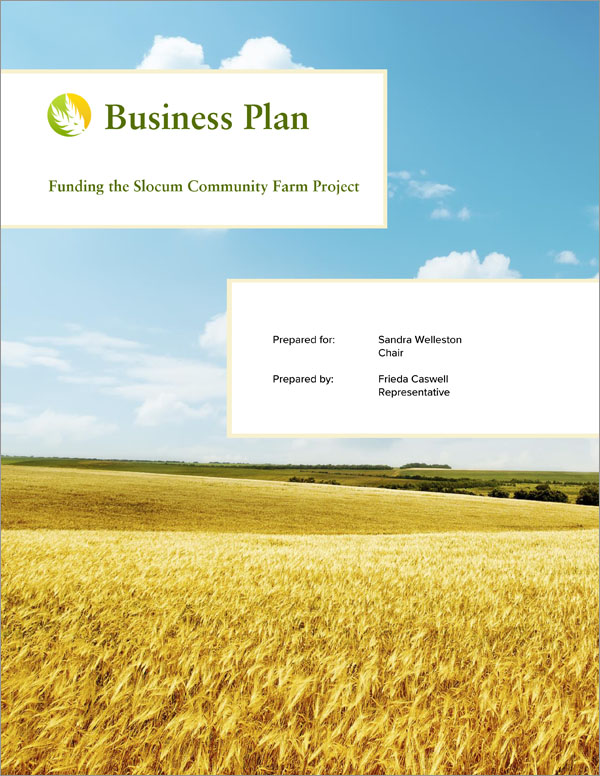
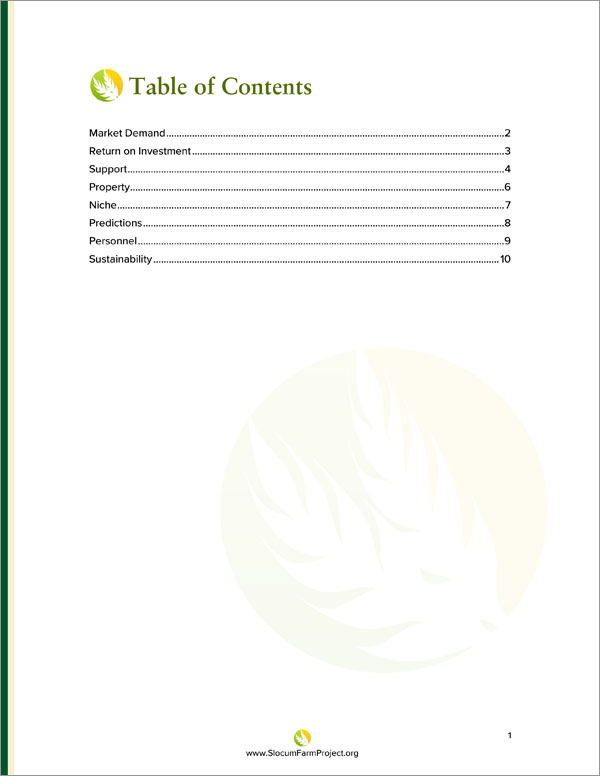
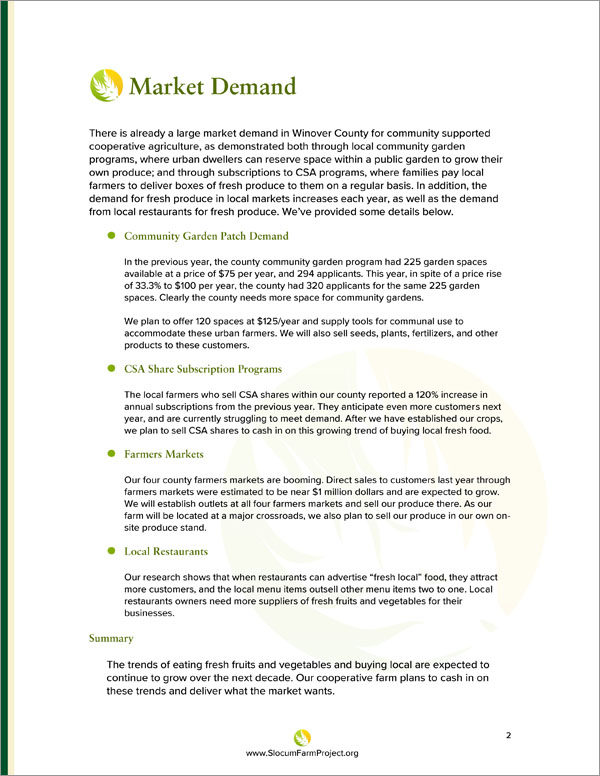
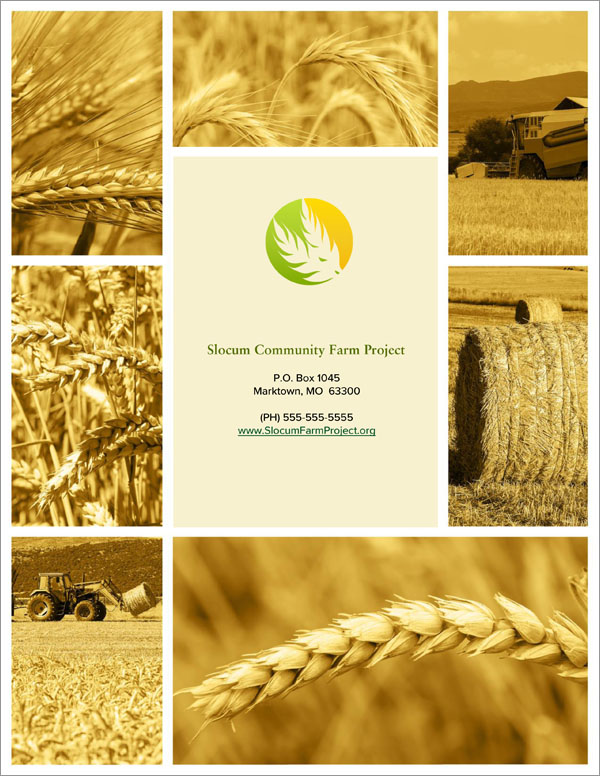
1. Get a Proposal Pack such as Agriculture #4
This sample was created using the design theme Proposal Pack Agriculture #4. You can recreate this same sample using any of our Proposal Pack design themes and have it customized for your business.
We include this Agricultural Grant Funding Sample Proposal in PDF and editable Word format chapters that can be customized using the included Wizard software when purchased with a Proposal Pack or the Professional Bundle.
To create your customized proposal using your logo and colors, get Proposal Pack for Any Business. We include this sample in every Proposal Pack.
2. Download and install after ordering
Once you have ordered and downloaded your Proposal Pack you will have all the content you need to get started. If you order the sample as a template you will download the Word document after ordering and edit it in your office software.
3. Set up the included Wizard software
While the Wizard software makes the process more efficient, you can manually assemble your version of this sample using the content provided and just a Word processor. We only include the Wizard software with a Proposal Pack or the Professional Bundle.
4. Import the Quick Start layout titled 'Agricultural Grant Funding Sample Proposal'
The included Proposal Pack Wizard software makes creating a customized version of this document speedy and efficient. The sample content is in Word format documents, so you can also use the sample text without using our Wizard software. Using the Wizard software, you can create custom variations of this template and automate your quotes with the line item database.
This is a good example to follow for anyone proposing farming or agriculture related projects.
Anyone seeking funding or in the agriculture industry.
5. Customize the template with your information
You can customize the layout with different chapters, change the order of chapters, import your content and information, change the visual design, edit the text, and more. You have complete control over customizing this sample.
Agricultural Grant Funding Sample Proposal - The Narrative
Slocum Community Farm Project
I represent the Slocum Community Farm Project. We are a group of five individuals committed to developing a jointly owned organic farm that will serve the local community with sales of organic produce and leases of family gardening plots. One of our group, Beverly Lawson, recently inherited the property we intend to use for our farm, and now we seek $40,000 in funding to convert the property for our intended use—growing organic fruits and vegetables for local sale, as well as creating community garden plots that urbanites can lease on a yearly basis to complement the county’s overloaded program. We have strong community support, investors from the local area, and the pledges of restaurants and farmers markets to accept our produce after harvest.
We strongly believe our business plan has been thoroughly outlined and will meet or exceed all of your funding requirements. We look forward to meeting with you to show you our plans and answer any questions you may have. The Slocum Community Farm Project is seeking $40,000 in funding to convert a recently inherited property into a community based organic farm.
There is already a large market demand in Winover County for community supported cooperative agriculture, as demonstrated both through local community garden programs, where urban dwellers can reserve space within a public garden to grow their own produce; and through subscriptions to CSA programs, where families pay local farmers to deliver boxes of fresh produce to them on a regular basis. In addition, the demand for fresh produce in local markets increases each year, as well as the demand from local restaurants for fresh produce. We’ve provided some details below.
Community Garden Patch Demand
In the previous year, the county community garden program had 225 garden spaces available at a price of $75 per year, and 294 applicants. This year, in spite of a price rise of 33.3% to $100 per year, the county had 320 applicants for the same 225 garden spaces. Clearly the county needs more space for community gardens. We plan to offer 120 spaces at $125 year and supply tools for communal use to accommodate these urban farmers.
We will also sell seeds, plants, fertilizers, and other products to these customers. CSA Share Subscription Programs. The local farmers who sell CSA shares within our county reported a 120% increase in annual subscriptions from the previous year. They anticipate even more customers next year, and are currently struggling to meet demand. After we have established our crops, we plan to sell CSA shares to cash in on this growing trend of buying local fresh food.
Farmers Markets. Our four county farmers markets are booming. Direct sales to customers last year through farmers markets were estimated to be near $1 million dollars and are expected to grow. We will establish outlets at all four farmers markets and sell our produce there. As our farm will be located at a major crossroads, we also plan to sell our produce in our own on site produce stand.
Local Restaurants. Our research shows that when restaurants can advertise "fresh local" food, they attract more customers, and the local menu items outsell other menu items two to one. Local restaurants owners need more suppliers of fresh fruits and vegetables for their businesses. The trends of eating fresh fruits and vegetables and buying local are expected to continue to grow over the next decade.
Our cooperative farm plans to cash in on these trends and deliver what the market wants. Detailed below is the Return on Investment ROI analysis for the project. The costs for the development, operations, and ongoing maintenance of the project vs. the benefits are summarized for a 5 year period.
As you can see by the chart above, the initial startup cost can be earned back within only a few years. Within ten years, we can easily sustain the farm project, pay back our investors, and make a healthy profit each year. All the profits earned by the farm will stay in the local community, thus supporting local schools and other small businesses.
Non Financial ROI Benefits
The non financial benefits of our communal farm project are immeasurable to the Winover County community. We will provide healthy organic food for the community, bees that will help pollinate nearby crops, and educational and recreational opportunities. We have broad local support for our communal farm project. Winover County Council. The Winover County Council has heartily endorsed our project and approved the creation and leasing of community gardens on the property.
Marktown Investment Network. Seven members of the Marktown Investment Network have each pledged to invest $20,000 to be paid back in 10 years at 5% interest. Winover County Restaurant Association. This local restaurant association is enthusiastic about our farm as a new source of fresh local produce. Ten restaurant owners have expressed desires to purchase produce from us as soon as our first harvest is in.
Winover Farmers Market Association. All four farmers markets in Winover are eager for our new farm to sell produce in their roadside markets. Beekeepers Association of Missouri. Our state association of beekeepers was excited to learn that we plan to establish our own bee colony on our farm. They will add our farm name and address to their literature, help us create a healthy, thriving bee colony, and assist us in selling honey and beeswax products. Organic Farm Council of Missouri. This state council will assist us with gaining and maintaining our organic certification, and will also assist us in marketing our organic products.
Winover Community College. Our local community college wants to use our farm as a teaching example of organic gardening. They plan to bring groups of students to see our farm, and agriculture students at WCC may also serve as a pool of part time interns as needed. In addition to all the organizations listed above, the community at large is enthusiastic about the possibility of a new small organic farm and community garden.
There is currently an unmet community demand for CSA subscriptions and leased garden plots. The property on which we propose to establish the communal farm is the old Slocum farm, located at 1032 Market Road. This property was inherited by Beverly Lawson on the death of her uncle, Jonas Slocum, who specified in his will that the property was to continue as a farm. The property encompasses 512 acres.
It is currently used for the following purposes. Pasture for cattle currently leased by the neighbor 60% , production of hay 30% , and a market garden now abandoned 10%.
Buildings
On the property is a farmhouse built in 1958, a barn constructed the same year, and several small equipment and storage sheds. All are in good shape.
Utilities
Water is supplied by two wells on the property and is adequate for all needs proposed for the farm project. A septic system is in place and is large enough to handle several additional bathrooms on the property. Electricity is supplied by the county utility district.
Machinery
All machinery and tools left on the property by Jonas Slocum were inherited by Beverly Lawson. These include a tractor, plow, harrow, and various other farm implements that are all in usable condition. The property now owned by Beverly Lawson is ideal for our communal farm project. Real estate taxes and upkeep are the only expenses that our group will need to pay for use of this property.
While most farmers sell their crops to large wholesalers, we plan to sell directly to local customers, including businesses and individuals. Why is this important. It allows us to cash in on the "Buy Local" and "Eat Fresh" and organic food movements, build our local community presence, and save money in transportation costs and fees paid to wholesalers.
The local farm sales niche is characterized by. Farmers Markets This is the primary outlet for our produce. We are lucky to have year round farmers markets in our county, which are also always a big tourist draw. Customers Who Prize Fresh Produce Studies show that customers who demand fresh local organic produce are willing to pay more for it than frozen items shipped from distant suppliers.
There are many fresh food enthusiasts in this area. Community Presence and Participation. It’s important for farmers selling local produce to be known in their community. To this end, we plan to participate in local festivals, sponsor local events, and host community events at the farm. Also, each participant our community garden operation will help get the word out to friends and relatives about our farm and our produce.
While the reputations of big commercial farms are diminishing in the public opinion every year as the public becomes aware of the dangers of monoculture and mass production of food, local community farming operations are making great gains. Based on local and national food purchasing trends, we predict the following. The "Buy Local" movement will grow substantially over the next decade. Rising fuel costs, the emphasis on healthy eating and organic produce, and attention to environmental issues such as carbon footprints will cause more and more customers to look to local farmers for their food.
Farmers markets will gain even more popularity in the coming years. Farmers markets are quickly becoming the "in" places to socialize with friends and neighbors, as well as places to buy local produce. Our local farmers markets plan to expand their hours and add more booths to accommodate demand in coming years.
Interest in organic farming will continue to grow. The public is becoming increasing concerned about antibiotics and agricultural chemicals in our food supply and water sources. Sales of organic food continue to gain market share each year.
Transportation costs will continue to rise. The cost of transporting goods around the world rises each year. Expensive transportation costs make the produce from local farms competitive with agribusiness companies that ship worldwide. Local delicacies will become the specialty items of the most popular restaurants.
This is already happening in our area. The most popular restaurant among tourists is the Rainbow Café, which advertises fresh local ingredients in their dishes. The most popular restaurant among local citizens is the Midway Barbeque Station, which advertises local beef and pork items and desserts made from local fruit.
For all the reasons listed above, we expect that demand for our farm products and support for our farm will grow with each year. The following personnel have agreed to participate in and manage this project. Craig and Beverly Lawson The Lawsons will live on the property and are experienced farmers.
For 15 years, they owned and managed a 500 acre farm in Owasso, Oklahoma, and raised and sold cattle, pigs, feed corn, milo, and hay to wholesalers. During the summer months, they also sold their organic garden produce—tomatoes, sweet corn, okra, green beans, radishes, carrots, and beets in their own successful roadside stand. Craig Lawson has a B.S. in Agricultural Engineering, and Beverly holds an associate degree in Accounting. They are experienced with farm management and keeping the books for an agricultural operation.
The Lawsons’ two sons—Jared, 14, and Michael, 16, will work on the farm from time to time. Kayleigh Bilsley and Joe Kaminski Kayleigh Bilsley and Joe Kaminski live approximately five miles from the farm property and will participate in the day to day management and work on the farm. Kayleigh has managed the Community Garden projects for the county for the last seven years, and has experience marketing garden produce to local vendors.
Joe grew up on a family farm in Kansas. He has managed the Hilyer Farmers Market for five years, and knows the local farming community well. Frieda Caswell Frieda Caswell is the president of the local Restaurant Owners Association, and a well known community activist and leader.
She will help as needed with day to day work, but will focus her efforts on marketing and promotional efforts, including setting up special events on the farm. Our team is experienced and well prepared to take on the responsibilities of developing and managing a communal farm. The project has been designed to be sustainable beyond the initial funding period.
Initial funding will be used to purchase equipment, prepare fields, sow our first crops, and establish our own bee colony to pollinate our crops and create honey. We anticipate that after selling our first year’s harvest, we will have sufficient funds to invest in all necessary products for our second year, and experience profits every year thereafter. We are not dependent on the abilities of only one owner, and because we are selling locally, we will not be influenced by the fluctuating prices of the nationwide agricultural market.
This is a project that involves multiple families and a large segment of the community, so we have a large base of support and customers to draw upon. We plan to expand our market and our community involvement as we grow. In the future, we plan to grow a variety of crops according to the demands of local consumers, develop a U Pick operation so that people can pick their own produce, sell CSA subscriptions, sell honey and beeswax products from our bee colony, and host and sell tickets to community events such as wine tastings, cooking classes, and outdoor concerts.
 What Our Clients Say
What Our Clients SayOriginally had little need to write proposals. But business has changed and has become more proposal-intensive. This kit has taken much work out of the writing for our employees. Thanks for making it simple!"
Length of Sample
12 PagesThere are thousands of chapters to choose from in Proposal Pack. This sample uses the following set of Proposal Pack chapter templates: Cover Letter (Business Plan), Title Page, Table of Contents, Support, Market Demand, Property, Predictions, Niche, Return on Investment, Personnel, Sustainability, Back Page.
There are 200 complete sample proposals including this one in each Proposal Pack
The following related samples are also included in Proposal Pack:
These template layouts are related to this sample
The following related templates are also included in Proposal Pack with this sample:
This sample illustrates how to write the following types of proposals
- Non-technical proposal
- Non-government grant, non-profit, NGO proposal
- Business plan, loan, investor funding proposal
- Real estate, property proposal
- Nature, environmental proposal
- Food, beverage, catering, grocery proposal
- Agricultural proposal
- Many other types of proposals
Samples can be created in any Proposal Pack design theme
This sample was created with Proposal Pack Agriculture #4. To change the visual look purchase any Proposal Pack and this sample will be created in that design theme.
Out of the over 501 Proposal Packs available these designs are also popular for this type of proposal and this sample proposal is also included in every Proposal Pack:
Photo Design Proposal Packs
 Proposal Pack Agriculture #5
Proposal Pack Agriculture #5 Proposal Pack Business #20
Proposal Pack Business #20 Proposal Pack Food #5
Proposal Pack Food #5 Proposal Pack Symbols #8
Proposal Pack Symbols #8Line Art Design Proposal Packs
 Proposal Pack Agriculture #1
Proposal Pack Agriculture #1 Proposal Pack Agriculture #2
Proposal Pack Agriculture #2 Proposal Pack Agriculture #3
Proposal Pack Agriculture #3 Proposal Pack Nature #1
Proposal Pack Nature #1 Proposal Pack Nature #2
Proposal Pack Nature #2 Proposal Pack Nature #3
Proposal Pack Nature #3 Proposal Pack Nature #5
Proposal Pack Nature #5 Proposal Pack Outdoors #1
Proposal Pack Outdoors #1
 4.7 stars, based on 841 reviews
4.7 stars, based on 841 reviews Ian Lauder has been helping businesses write their proposals and contracts for two decades. Ian is the owner and founder of Proposal Kit, one of the original sources of business proposal and contract software products started in 1997.
Ian Lauder has been helping businesses write their proposals and contracts for two decades. Ian is the owner and founder of Proposal Kit, one of the original sources of business proposal and contract software products started in 1997.By Ian Lauder
 Published by Proposal Kit, Inc.
Published by Proposal Kit, Inc.


 Cart
Cart
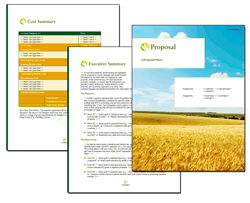
 Facebook
Facebook YouTube
YouTube X
X Search Site
Search Site